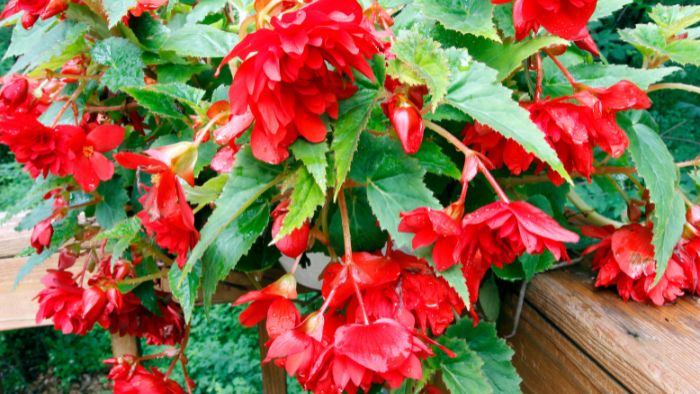The Perfect Soil Mix for Lush and Happy Begonias
Begonias are some of the most stunning flowering plants that can brighten up any indoor space or outdoor garden. With their dazzling array of colors, shapes, and sizes, from bold and metallic-leaved rex begonias to diminutive flowering carpet varieties, begonias have an unbeatable charm and diversity. However, to get the most out of your begonias and have them thrive happily, finding the right potting soil mix is key. Let’s explore the ideal soil properties and ingredients for mixing custom soils tailored to your specific begonia types and growing conditions.
Drainage is Crucial
Excellent drainage is by far the most critical element for begonia potting mixes. Begonia roots easily rot if left sitting in heavy, waterlogged soil. Incorporating amendments like perlite, bark chips, coco coir, horticultural charcoal, or anything else lightweight creates essential air pockets and prevents soggy soil. Aim for a loose, porous blend that water can flow right through.
Retain Just Enough Moisture
At the same time, begonias don’t like to dry out completely. Ingredients like peat moss, coco coir, compost, or milled sphagnum moss help the soil retain just enough moisture between waterings. The mix should feel lightly damp but never soggy wet.
Acidic Soil is Best
Most begonias thrive best in slightly acidic soil with a pH between 5.5-6.5. This pH range optimizes nutrient availability and further deters root rot. To acidify soil, incorporate amendments like peat moss, composted oak leaves, pine needles, or aged bark.
Moderate NutritionWhile begonias appreciate nutrients, they are generally light to moderate feeders. A balanced organic slow-release fertilizer mixed into the soil gives them a steady diet without risk of nutrient burn.
Maximize AerationAir circulation is vital for begonia roots. Blending in perlite pumice or other airy additions creates plenty of air pockets for healthy oxygen exchange.
Outdoor Begonia Mixes
For growing begonias in garden beds or pots outdoors, focus on free-draining, lightweight blends. Here are two sample mixes to try:
-
1 part peat moss or coco coir
-
1 part perlite or vermiculite
-
1 part compost, leaf mold, or aged pine bark
-
1 part coco coir or peat
-
1 part perlite
-
1 part orchid bark or horticultural charcoal
-
1 part compost or worm castings
Feel free to adjust proportions to achieve your target texture and drainage speed.
Indoor Begonia Mixes
Indoor begonias appreciate extra moisture retention. Aim for blends like:
-
2 parts peat moss or coco coir
-
1 part perlite or vermiculite
-
1 part compost or worm castings
-
2 parts coco coir
-
1 part perlite
-
1 part orchid bark
-
1 part worm castings
-
1 teaspoon organic slow-release fertilizer per gallon of mix
The extra coco coir and castings help retain water while the added fertilizer provides gentle nutrients.
Terrarium & Enclosed Container Mixes
The humid environment of terrariums and enclosed containers lends itself perfectly to growing begonias. Try a blend like:
- 2 parts peat moss or coco coir
- 1 part fine orchid bark or horticultural charcoal
- 1 part milled sphagnum moss
- 1 teaspoon time-release fertilizer per gallon of mix
The sphagnum moss and charcoal retain moisture without compacting while the fertilizer feeds plants in the confined space.
Get Creative with Your Own Mixes!
The mixes here are just starting points for crafting your own custom begonia soils. Experiment with different amendments and proportions to find your plants’ happy place. The key is nailing that balance of drainage and moisture retention. Tweak your mix based on your specific begonias’ needs and watch them thrive!
With a properly tailored soil foundation, your begonias will flourish and brighten your indoor and outdoor spaces with their fantastic flowers and colors. Don’t be afraid to channel your inner mad scientist conjuring up the perfect potting mix. Your begonias will reward you with their lush, vibrant beauty.

Identifying and Resolving Unhealthy Soil
Mold growth, a foul odor, or excessive moisture are tell-tale signs that your Tuberous Begonias soil has gone rogue. These symptoms can throttle flowering and leave your plant gasping for breath.
Proportions and Considerations
- Peat Moss: Use about 50-60% of your total mix. Its the base that cradles your begonias roots in moisture-retentive tenderness.
- Perlite: Aim for 25-30%. This isnt just fluff; its critical for preventing soil compaction and promoting root health.
- Organic Matter: The rest should be your well-rotted compost or worm castings. This stuff is gold, providing a buffet of nutrients for your begonias.
Begonia Rex Care Tips | 9 Things You Should Know!
FAQ
What is the best soil mixture for begonias?
Begonias will grow in any good soil that drains well. For potting, use a mixture of approximately four part well-decayed leaf mold, one part garden loam, and one part coarse sand.
What is the secret to growing begonias?
In partial sun and ideal temperature conditions, begonias bloom for up to six months. Fertilize regularly with a high-phosphorus plant food to ensure blooming.Apr 15, 2025
Is Miracle Grow potting soil good for begonias?
Begonias grow best in a light well-draining potting mix. Wendy top dresses each pot with a fresh layer. Any good quality light potting mix will work well. We use one from Miracle-Gro, which can be used for both indoor and outdoor container plants.
Can I use orchid potting mix for begonias?
A Note About Begonia Potting Mix.
Try two parts Organic Potting Mix, one part Special Orchid Potting Mix, and one part Wiggle Worm. Begonias especially appreciate the earthworm castings. Castings are full of Nitrogen, and Begonias love to feed.
